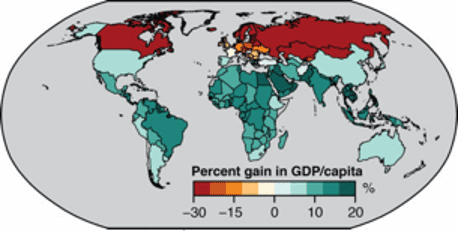
By 2100 it’s likely that limiting warming to 1.5 °C rather than 2 °C would provide benefits to the global economy of more than $20 trillion. Over 70% of countries – including 90% of the world’s population – would have a high chance of experiencing these reduced economic damages.
“Over the past century we have already experienced a one degree increase in global temperature, so achieving the ambitious targets laid out in the Paris Agreement will not be easy or cheap,” said Marshall Burke of Stanford University, US. “We need a clear understanding of how much economic benefit we’re going to get from meeting these different targets.”
Current national emissions pledges made before the UN climate talks in Paris in 2015 look set to bring global warming of 2.5–3 °C. Burke and colleagues estimate this could reduce global GDP by as much as 15–25% by the end of the century relative to a world without warming above 2000–2010 levels.
“It is clear from our analysis that achieving the more ambitious Paris goals is highly likely to benefit most countries – and the global economy overall – by avoiding more severe economic damages,” said Noah Diffenbaugh of Stanford University.
Reaching emissions levels in 2030 that are consistent with the 1.5 °C aspirational goal will need around $300 billion in additional abatement costs compared to meeting the 2 °C commitment, according to a recent estimate. These costs are more than 30 times smaller than Burke and colleague’s median estimate of mid-century avoided damages.
“For most countries in the world, including the US, we find strong evidence that the benefits of achieving the ambitious Paris targets are likely to vastly outweigh the costs,” said Burke.
The researchers made their projections by analysing how economic performance in the form of GDP over the past 50 years correlated with changes in temperature. Then they combined these findings with climate model projections of future temperatures to calculate how overall economic output may change under different warming scenarios.
“The countries likely to benefit the most are already relatively hot today,” said Burke. “The historical record tells us that additional warming will be very harmful to these countries’ economies, and so even small reductions in future warming could have large benefits for most countries.”
The world’s three largest economies – the US, China and Japan – should all benefit if warming remains below 1.5 °C.
Higher temperatures are likely to increase costs from dealing with extreme events, reduce agricultural productivity and harm health.
The study may underestimate the costs of higher levels of climate change if the Greenland or Antarctic ice sheets see rapid melting, or if extreme weather events intensify beyond historical observations, the researchers believe.
The team reported the findings in Nature.



